Course Authors
Dr. Fry worked with young adults in Student Affairs on campuses in Illinois, Wisconsin, California, Missouri and Minnesota before moving to St. Paul to pursue her doctorate in Educational Leadership at the University of St. Thomas. Her passion then became preparation of high school students for post-secondary success.
In 2005, Saint Paul Public Schools (SPPS) began the AVID College Readiness program, and Dr. Fry became the Program Manager from 2005 to 2010. In 2010, she was named the first director of the Office of College and Career Readiness for SPPS.
In 2014, she left the school district to begin a non-profit focused on assisting vulnerable youth, especially those from foster care. In the school district, she saw the devastating outcomes for kids that had been in and out of home placements. As an adoptive mother, she understood that those same outcomes could have occurred for her own child. Irreducible Grace Foundation was born out of the need to support youth in out-of-home placements to finish high school and go to post-secondary opportunities.
The Black Youth Healing Arts Center in St. Paul, MN, provides cultural, ancestral, and innovative processes to healing for Black youth foremost, while creating safe spaces and healing opportunities for all youth of color.
